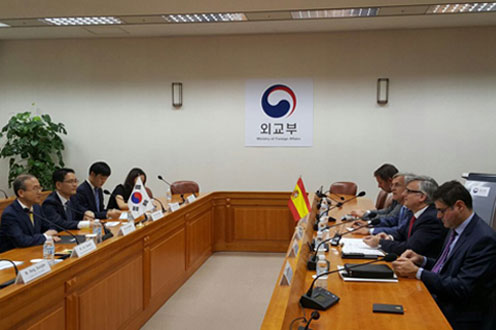He also held meetings with the Second Vice Minister for Foreign Affairs, Cho Taeyul, the President of the Institute for Foreign Affairs and National Security (IFANS), Shin Dong-ik, the Vice Minister for Unification, Kim Hyung-seok and the Director of the United Nations Office of the High Commissioner for Human Rights in Seoul, Signe Poulsen.
During his stay in the Republic of Korea, he visited the de-militarised zone that separates the two Koreas, where he talked with representatives of the United Nations.
He also held a working breakfast with the management board of the Spanish Chamber of Commerce where he was informed of the operations carried on by the institution founded a year ago and of the activity of its members.
Political consultations between Spain and Korea were established by a Memorandum of Understanding on political dialogue signed back in 2007. Since then, consultations have been held annually at a vice-ministerial level, together with other regular meetings of senior officials from the two ministries of foreign affairs, opening up dialogue on regional, global and security issues. One important result of the consultations in 2016 has been the decision taken by both countries to step up the level of dialogue in forthcoming editions, which will allow for a more detailed and extensive examination of the strategic risks and opportunities for both countries.
At the political consultation meeting held in Seoul, they tackled the recent political and economic developments in both Spain and South Korea, the schedule for institutional meetings, as well as the progress on structured dialogue held by the two countries on bilateral cooperation, on issues of security and in relation to Ibero-America. On this issue, they tackled the forthcoming incorporation of South Korea as an Observer State at the Ibero-American Summits, which Spain promotes and supports. The meeting was also used to tackle bilateral agreements and instruments under negotiation, collaboration through the United Nations and the smooth progress of bilateral cooperation at an economic, technological and cultural level and between their respective civil societies.
The development of trade relations between the two countries has taken a very positive turn in recent years, with a significant increase in trade flows in both directions and the consolidation of the Republic of Korea as our third leading customer in the Asia-Pacific region. Following the conclusion of the EU-Korea free trade agreement in 2011, trade exchanges in both directions amounted to 4.14 billion euros in 2015, of which 1.85 billion corresponded to Spanish exports.
In terms of civil society, they tackled the positive development of tourism since direct flight paths were opened up in 2012 between Spain and South Korea. 311,000 Korean tourists visited out country in 2015, an 86% increase on 2014, thus placing South Korea as the Asian emitting market to enjoy the largest growth. The Korean authorities tackled the important economic role played by this industry and expressed their interest in further familiarising themselves with the Spanish model and establishing bilateral cooperation mechanisms in this field.
At a scientific and technological level, major progress is being made on bilateral cooperation, with growing participation between Spain and Korea on international programmes such as the Eureka Programme and the Horizon 2020 and increasingly closer contact between our communities of researchers following the agreements signed between our State Secretariat for R&D+i and the Centre for the Development of Industrial Technology (Spanish acronym: CDTI) and their respective South Korean counterparts in 2015 and 2016.
The two countries welcomed the smooth progress of collaboration between Casa Asia and the Korea Foundation, which annually organise the Spain-Korea Forums, the main source of bilateral contact between our think tanks and civil society. The two delegations welcomed the excellent work done in previous editions and conveyed their support for the upcoming edition in Korea of the 11th Spain-Korea Forum.
In terms of issues on the global agenda, during the meetings they tackled political and security developments on the Korean Peninsula, including the challenges by North Korea to the nuclear and ballistic non-proliferation regime and the human rights situation. The two delegations also tackled other political and security challenges in Europe and the Asia-Pacific region, including the recent terrorist attacks in Europe, migratory flows in the Mediterranean and the outlook for the two countries following the 'Brexit'.





